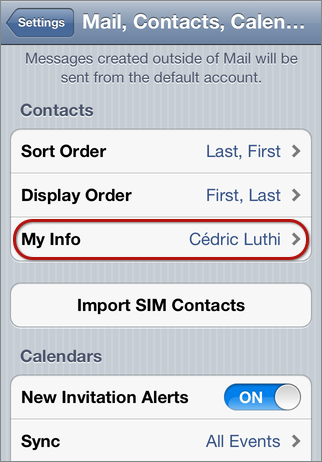Unlike the Mac Address Book API, the iOS Address Book API does not come with the ABGetMe function. ABGetMe circumvents this limitation by trying to read My Info from the Contacts settings.
If My Info is not found, then ABGetMe tries to match the configured e-mail account addresses with the records of the address book to find the me record.
If the me record is still not found, then ABGetMe finally tries to extract the device owner's full name from the device name in order to find the me record. This technique was explained by John Feminella in his answer to How does Square know my name in their app's registration process? on Quora.
- ABGetMe requires iOS 4.0 or later.
- ABGetMe can be compiled either with or without Automatic Reference Counting (ARC).
-
Copy
ABGetMe.handABGetMe.minto your Xcode project -
Use the
ABGetMe()function and don’t forget to check if the result is notNULL.ABAddressBookRef addressBook = ABAddressBookCreate(); ABRecordRef me = ABGetMe(addressBook); if (me) { // do something with "me" } CFRelease(addressBook);
ABGetMe is not legally App Store compliant because it uses undocumented APIs which is proscribed by clause 3.3.1 of the iPhone Developer Program License Agreement. It is technically App Store compliant though as it will pass the App Store validation. Moreover, it should not crash even if the undocumented APIs change in the future.
- Reading My Info from the Contacts settings uses undocumented APIs.
- Reading configured e-mail account addresses uses undocumented APIs.
- Reading the device name is a public API.
You can disable private APIs by setting ABGETME_ENABLE_PRIVATE_APIS to 0 instead of 1 at the top of the ABGetMe.m file. Note that disabling private APIs considerably reduces the chances of finding the me record. The only method left to find the me record when disabling private APIs is the last one (i.e. matching the device name) which only works if the device owner never changed the default device name.
